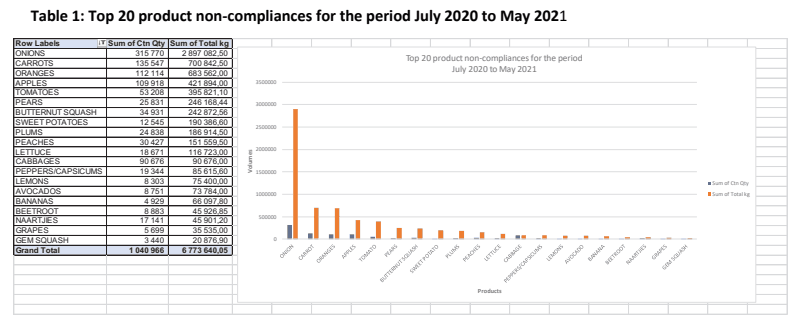 Meat Safety Act, 2000
Meat Safety Act, 2000
R 385
Agricultural Product Standards Act, 1990 (Act No. 119 of 1990)NoticesProduct Control for Agriculture (PROKON) - Inspection FeesMethodology applied to determine the Inspection Fees to be charged on regulated fruits and vegetables intended for sale in the Republic of South Africa1.4 The necessity for Quality Assurance Inspections |
During a two-year period (June 2019 to May 2021) 4 814 directives were issued in respect of produce at fresh produce markets, retailers, wholesalers and importers which did not comply with prescribed standards set out in the relevant regulations. The majority of non-conformances were found on fresh produce markets. The aforementioned statistics is clear proof that there is a definite need for quality assurance inspections on fresh fruits and vegetables to protect the relevant value chain as a whole as well as to ensure that the consumer purchases a product that complies with official quality and health regulations.
The following problems / non-conformances, which may differ between products, were found in respect of locally produced produce:
| • | Consignments are not marked, e.g., no information is provided on the packaging in respect of name / trade name of the supplier / producer and contact details, cultivar / variety, class, weight, date of packing and country of origin. This is especially the case in respect of lower class produce. (Compliance in terms of marking is extremely important in order to ensure that the origin of the product can be traced should quality and health related complaints be lodged.) |
| • | Different sizes are packed in the same container / bag. |
| • | Underweight packaging. |
| • | Consignments do not comply with the official internal and external quality standards. |
| • | Products that were harvested immaturely (ripeness). |
| • | Incorrect sugar levels. |
As far as imported produce is concerned the following are examples of the problems / non-conformances found:
| • | A large consignment avocado was illegally imported from Tanzania. Prokon informed the Inspectorate of the Department of Agriculture, Land Reform and Rural Development who confiscated and destroyed the consignment to the benefit of the local industry and the consumer. |
| • | Indicating the wrong country of origin. |
